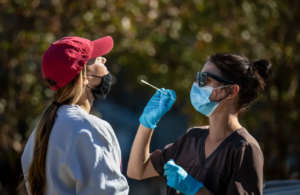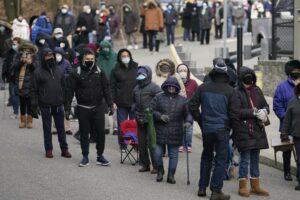Texas won’t require schools to notify parents of COVID-19 cases

Texas school districts will not be required to conduct contact tracing this year if a student contracts COVID-19, according to new guidelines issued by the Texas Education Agency this week.
The agency said a district should notify parents if it learns of a student who has been a close contact to someone with the virus. But with the relaxation of contact tracing, broad notifications will not be mandatory.
The TEA announced its rules in public health guidance issued Thursday. While districts must report positive cases to their local health departments and the state, the TEA said contact tracing will not be required because of “the data from 2020-21 showing very low COVID-19 transmission rates in a classroom setting and data demonstrating lower transmission rates among children than adults.”
But some public health experts quickly questioned that rationale, noting that the more contagious delta variant of the virus was not prevalent during the last school year.
“We’re going to find that the transmission rate in schools is going to be much higher with the delta variant and it’s absolutely imperative that people get back to masking,” said Dr. Marc Mazade, medical director of infection prevention at Cook Children’s in Fort Worth.
The new guidance allows for remote learning for up to 20 days for students who are sick with COVID-19 or have been exposed to it. If more time is needed, schools can apply for waivers. Longer-term remote learning has largely been defunded after it was offered at the start of the pandemic, and efforts to allocate funding for it have so far failed in the Legislature this year.
Texas schools vary in when they return to the classroom, with many starting in days or having already begun. Many hoped for a safer and easier return to school after COVID-19 hospitalizations and infections declined in the state. But with the emergence of the delta variant, cases and hospitalizations — including of children — are once again surging upward, especially among unvaccinated populations, alarming some public health experts, parents and teachers.
The TEA is also allowing schools to conduct rapid tests on staff to mitigate the risk of asymptomatic individuals being on campuses. With written permission from parents, students also can be tested. Parents and school officials are to continue keeping students out of classrooms if they have COVID-19 or are exhibiting symptoms. Parents also can choose to keep their kids home for 10 days after learning their children had close contact with someone who contracted the virus, according to the new guidance.
Dr. Seth D. Kaplan, president of the Texas Pediatric Society and a Frisco-based pediatrician, said his organization believes contact tracing should be mandated in schools. After the TEA announcement, his organization contacted the Texas Department of State Health Services to urge officials to mandate contact tracing and rethink the TEA guidance, he said.
“Our concern right now is that we’re being given guidelines based on old conditions, but we’re not adjusting for what the current conditions are,” Kaplan said. “We no longer have universal masking, and we have a much more contagious variant of virus. … Not doing contact tracing is based on the old rules of the game.”
Kaplan said physicians observed COVID-19 outbreaks at summer camps where the “numbers just started to explode.” He said he’s seen parents who had to be hospitalized in the intensive care unit after contracting the virus from children who returned from camp.
While the number of children who are hospitalized or die from COVID-19 is still rare, Kaplan said complications are rising as the delta variant spreads, and medical experts are still learning how the variant affects children.
“We’re dealing with a variant that is more contagious, that is potentially more dangerous to children based on the number of children getting admitted to the hospital,” he said. “Thankfully it’s still a small number, but it is an increasing number to levels that we haven’t seen previously in the pandemic.”
Texas State Teachers Association President Ovidia Molina said in a statement that the new guidance fails to relieve the anxiety and fears that many face going back to school in light of the inability for districts to mandate masks.
“The approach outlined in TEA’s new guidance fails to holistically address COVID-19 outbreaks at a campus level,” Molina said in a statement. “Even with the reporting requirements for positive Covid-19 cases, the new guidance comes up woefully short to help districts keep campuses, students and employees safe.”
The Centers for Disease Control and Prevention recently recommended universal indoor masking for all teachers, staff, students and visitors to K-12 schools, regardless of vaccination status, amid rising counts of the delta variant. However, Gov. Greg Abbott has blocked public entities, including schools, from mandating masks or vaccines. The TEA echoed that restriction in its latest guidance. Many health experts are calling for parents to voluntarily mask their children and vaccinate them if they are eligible.
As the school year draws near for most of Texas, Mazade, the Fort Worth hospital official, said his organization has begun to see a rapid rise in COVID-19 hospitalizations and emergency center visits. Most patients are unvaccinated, and they’re usually infected by an unvaccinated family member. The hospital is also seeing an outbreak in respiratory syncytial virus, which is usually seen between October and March. This third pandemic surge and RSV outbreak are straining resources, he said.
For children who can’t be vaccinated, Mazade recommends parents “cocoon” their children by vaccinating themselves and others around them and that everyone wear masks while in school.
Stephanie Stoebe, a fourth grade teacher at Teravista Elementary School in Round Rock, said while the TEA didn’t make it a requirement for parents to be notified of cases, she believes school administrators and parents should notify one another if a child either has COVID-19 or is exhibiting COVID-like symptoms.
“I would support the contact tracing,” Stoebe said. “If a kid in my class got lice or pink eye, I sometimes have to notify parents. So if I have to notify a parent because someone in the class got lice, it would still would make sense to me that I would notify a parent that someone in class has COVID.”
At least one school district is considering flouting Abbott’s order. Millard House II, superintendent of Houston Independent School District, said Thursday that he plans to bring a mask mandate to a vote at the district’s board meeting next week — pointing to increasing hospitalizations and infections. Houston ISD is the state’s largest school district and appears to be the first district poised to go against Abbott’s order.
“We know that we’re gonna get pushback for this. We know that people will be angry,” House said. “But what we have to understand is, if we have an opportunity to save one life, it’s what we should be doing.”
Organizations such as Texans Care for Children and the Texas American Federation of Teachers have called on Abbott to allow local school officials to make their own decisions regarding masking policies.
Austin ISD also has said that it will require masks on school buses.
A spokesperson for the governor did not immediately respond to a request for comment.
Abbott announced his agenda Thursday for the second special legislative session, which included education priorities. The governor wants legislation that keeps masking and COVID-19 vaccination voluntary. He also added that in-person learning should be available for any student whose parent wants it, with the broad language leaving the door open for a bill to pass that could fund virtual learning.
The TEA’s guidance will put more interest in virtual learning during the second special session, and especially draw out deeper conversations on how to fund remote instruction moving forward, said Bob Popinski, director of Raise Your Hand Texas. But, in the near future, school districts might run into logistical issues as they prepare to offer remote instruction to students who have the virus or are exposed to it. Staffing may become an issue as classroom teachers cannot teach remote students, according to the guidance.
“Everything over the last 18 months is ever-evolving policy when it comes to providing our students instruction during these times,” he said.
This article was originally posted on Texas won’t require schools to notify parents of COVID-19 cases







